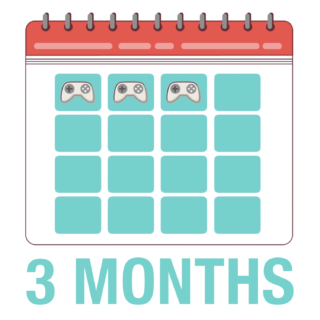For six years, Robert Bowling was the face of Call of Duty developer Infinity Ward, serving as a creative strategist at the studio. Since then, Bowling has been involved in everything from game development to eSports (he’s a co-owner of the team Denial), most recently serving as an advisor for Team NRG. The entrepreneur has also launched GamePump, a new retro-focused gaming service.
The service will officially launch in January on Steam, offering gamers a “blind” subscription model that guarantees users one new classic game on the first Friday of every month for $20 per year, $15 for three months or $5 for one month. All subscriptions are non-recurring. Last year, when he was vice president and head of publishing at Humble Bundle, he launched Humble Monthly, which was also a blind subscription service but focused on newer indie games. Bowling said that the issue was that gamers likely already owned some of those games. With GamePump, every game will be making its Steam debut through this service.

“GamePump came from my own personal interest in games that I wanted to play but weren’t readily available,” Bowling told [a]listdaily. “I did some research and found that 90 percent of the time with these games, it was a legal issue where it ended in bankruptcy or someone owned the rights and didn’t realize it. Once I realized that, there were enough of these games that we could publish on Steam.
GamePump currently has 20 games in the pipeline as well as a few spiritual successors or modern remakes redone by a current developer in the works. “The main console we’re pulling games from is the 1983 MSX,” Bowling said. “We found Nintendo doesn’t allow you to emulate any hardware because they’re doing it themselves. But if Japanese publishers released the same NES game on non-Nintendo systems like MSX, we could acquire the MSX version. It’s the same game, but we need to localize them. The nice thing is that many MSX versions will have an extra level or different ending that the American audience never got to enjoy.”
Bowling said he’s also looking at the Sega CD catalog and some retro PC games that are not currently available to add to GamePump in the future. “A lot of deals are being closed, but the goal is to make this as diverse an experience as possible,” Bowling said. “We want to have a mix of genres so it’s always different.” The original plan was to launch this holiday, but Bowling said it has taken an unexpected amount of time to revive some of the older classics.
Bowling is marketing GamePump across social channels, which includes his 2.2 million followers. He also plans on some traditional advertising on social media. “We’re working with Twitch and YouTubers on an influencer campaign,” Bowling said. “This is an organic growth opportunity. The hope is, once it starts dropping, people will start talking about it. Releasing one game a month gives people time to talk about it.”
GamePump is a small operation with just a few people in Los Angeles. Bowling explained that half of his company does legal work untangling games from multiple acquisitions or bankruptcy while the other half is game development.
While Steam is the focus at launch, Bowling is open to publishing these games across other platforms outside of subscriptions. “We want to tread carefully and focus on building this business,” he said. “Steam is the easiest path and makes the most sense.”
 Each game deal is on a case-by-case basis due to the nature of the legal contracts. Sometimes GamePump acquires an entire catalog of games, and in those cases, they can release them on as many platforms as possible. “In rarer cases, it’s a larger publisher like a Konami or a Microprose, where they’re not going to sell the catalog but they will license it to bring to Steam because they’re not going to do it themselves and we split revenue with that publisher,” Bowling said. “If Steam goes well, it’s not farfetched to do releases on other platforms. We’re trying to own as much as we can, but sometimes it’s worthwhile to get IP you don’t own.”
Each game deal is on a case-by-case basis due to the nature of the legal contracts. Sometimes GamePump acquires an entire catalog of games, and in those cases, they can release them on as many platforms as possible. “In rarer cases, it’s a larger publisher like a Konami or a Microprose, where they’re not going to sell the catalog but they will license it to bring to Steam because they’re not going to do it themselves and we split revenue with that publisher,” Bowling said. “If Steam goes well, it’s not farfetched to do releases on other platforms. We’re trying to own as much as we can, but sometimes it’s worthwhile to get IP you don’t own.”
It was Bowling’s role as president and creative director at the game studio Robotoki that ultimately led to this new venture. “It was a hard reality check, going from a AAA developer where you have unlimited resources, to a Nexon publishing deal,” Bowling said. “We had 55 developers in LA and a massive game that was costing over $10 million and was an original IP. We chose the riskiest thing you could do. We ended up canceling it when we parted ways with Nexon to do it as a premium title instead of free-to-play because our burn rate wasn’t the same and we couldn’t ship it with our own money.”
Bowling said that experience taught him a lot about the industry and he saw an opportunity to assist other developers. “Making games is hard technically and from a business standpoint,” Bowling said. “That’s when I got into the investment side of the business, and that led to coming up with Humble Monthly, which were alternative revenue services for developers. I liked the publishing and project financing side of the business. I’m still doing other investment fund stuff, as well as some development.”

